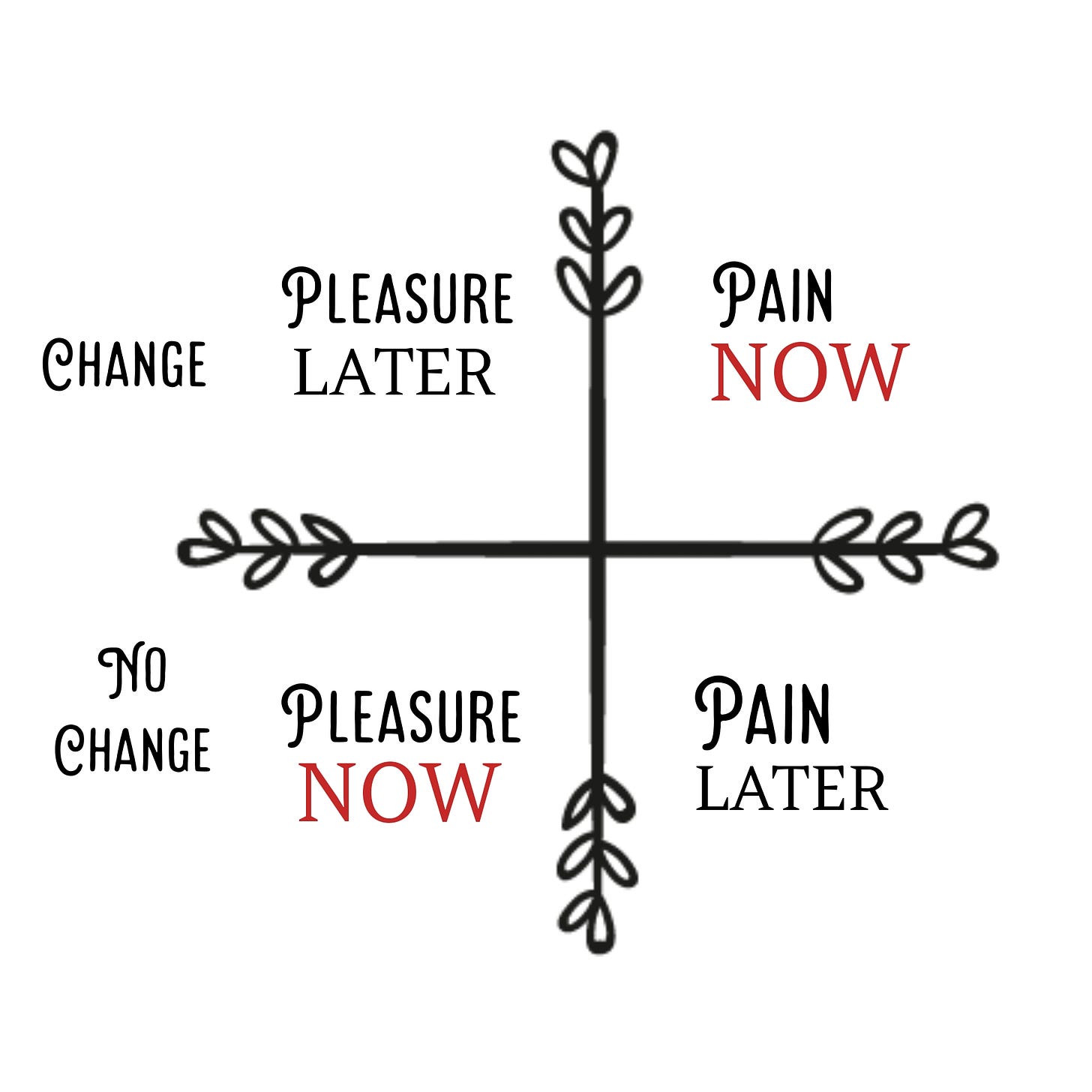It turns out that there are reasons why it’s difficult to make a change in your life. We’ve known for a long time that the will is not sufficient — there are neuro-cognitive phenomena involving genes, chemicals, and memories of early childhood experiences that are driving the ship. Patterns emerge for a reason. Certain things work in certain circumstances, and the limbic system makes sure the rest of the brain knows about it. This, I’m told, is because (believe it or not!) the brain actually wants to protect us! As we’ve gotten so used to it deceiving us for so long, it sometimes seems like the opposite is true.
So it goes with pain. We know that pain is instructive of risk. A burning sensation lets us know right away HOT! Get back. Wouldn’t want to lose that tissue. It would make a whole lot of other stuff vulnerable.
Similarly, our attempts to protect ourselves from external threats is also adaptive. (I know I’m using that word loosely.) As infants, we were glad to have protection from parents. (If said parent was then abusive — there’s a brand new dynamic.) Either way, seeking security and safeguarding ourselves from threat was perceived as beneficial, and for good reason. It’s those kinds of instincts that keep us alive in the “wild.”
You get all the expected chemicals in the ~ expected doses by doing the expected things.
In society, they can keep us blocked off and isolated. If one isn’t in the practice of testing the threshold and practicing exposure therapy, risks are not taken in career, love, friendship, and social life. This can be fine for some, and a balance is always available. That said, sometimes we find ourselves face to face with a sort of blockage. We know we want to change, but we can’t.
This is where the need to induce our own psychic pain can become necessary. I’m going to share with you a very shoddy graph I threw together in an interpretation of a concept introduced to me by Dr. Paul. I found this very instructive in understanding what it is that I am going through.
When you decide to make a change in your life, the first thing you need to understand is that you are going to be delaying a lot of gratification. This is because your brain and limbic system have created a reinforcing feedback loop with the undesirable behavior, codifying a habit pattern. You get all the expected chemicals in the ~ expected doses by doing the expected things. (Those with addictions know, however, that the dosage always needs to increase by a teensy little bit every time until suddenly they need to increase a LOT, which can be insanely disruptive and destructive.)
But the delayed pleasure is not the only challenge. (If only that were the case!) Instead, not only does a change in lifestyle require the willingness to stave off something that we love — it also requires the pain of the new disruption. What is that pain? It can be anything. It can be the soreness that comes from working out muscles with resistance training. It can be, as in my case, the psychic turmoil of trying to learn new things at night when I’m tired after my job so that I can turn my ship toward a new career. It can also be the physically awful disturbance that comes when we leave a relationship that just wasn’t working.
But if we didn’t make this change, we’d a.) continue to endure the low level pain that we were already experiencing quietly under the surface and b.) start to feel a very severe pain later on when that low level disturbance became an unavoidable threat. (Perhaps in a paid-only post sometime I’ll tell the story of how this happened to me.) When we realize later in life that we are now experiencing the negative aspects of something we could’ve easily avoided — that hurts.
So there are people out there like Jane McGonigal who are trying to help us gamify our progress with programs and apps like Superbetter. As Sean Ogle says, you can progress much more rapidly if you turn your small accomplishments into wins that you can celebrate. Support groups help us to get reinforcement from peers — in AA you can announce every time you get a day, a week, a month, a year or more sober, and many of the people at the meeting will applaud. (You get little prizes in the form of coins.) This gives you all the feel-good chemicals and reinforces the change you’re trying to make. A good coach or sponsor can also give you psychic pain by criticizing you in the right way when you’re trying to seek refuge in your regressive pleasure, shaming you conscientiously toward the future liberation.
And it’s necessary to have these strategies. Very few people are likely to simply decide to make a big decision and stick to it without such techniques. My offhand suspicion is that it gets even harder the more we’re surrounded by distractions and new ways to alter our chemical balances.
So hear! hear! Three cheers for pain — as long as it’s the self-inflicted kind that’s properly applied to guide us toward the benefit of our future wins. There’s no need to wantonly punish ourselves — a little compassionate toughness will do the trick.





